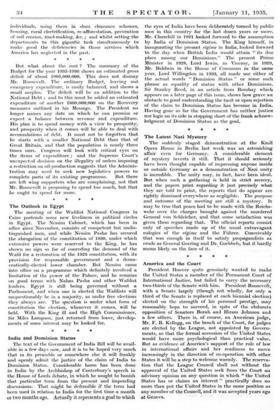India and Dominion Status The text of the Government of
India Bill will be avail- able in a few days now, and it is to be hoped very much that in its preamble or somewhere else, it will frankly and openly admit the justice of the claini of India to Dominion Status. Considerable harm has been done in India by the Archbishop of Canterbury's speech in the House of Lords debate, in which he sought to banish that particular term from the present and impending discussions. That might be defensible if the term had been used in relation to India for the first time a month or two months ago. Actually it represents a goal to which the eyes of India have been deliberately turned by public men in this country for the last dozen years or more. Mr. Churchill in 1921 looked forward to the assumption by India of Dominion Status. The King himself, in inaugurating the present regime in India, looked forward to the day when British India would attain " its due place among our Dominions." The present Prime Minister in 1928, Lord Irwin, as Viceroy, in 1929, Mr. Baldwin in the House of Commons in the. same year, Lord Willingdon in 1933, all made use either of the actual words " Dominion Status " or some such phrase as equality of status with other Dominions. Sir Stanley Reed, in an article from Bombay which appears on a later page of this issue, shows how grave an obstacle to good understanding the tacit or open rejection of the claim to Dominion Status has become in India. Having gone so far the Government has neither justice nor logic on its side in stopping short of the frank acknow- ledgment of Dominion Status as the goal._
* *






































 Previous page
Previous page